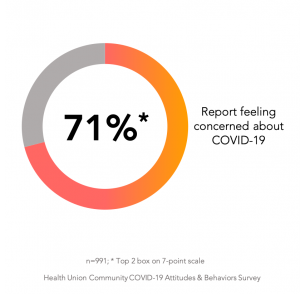
Worried, Anxious, But Prepared:
Perceptions of COVID-19 from People with Chronic Health Conditions
It would be difficult to find a person who isn’t impacted in some way by the global coronavirus pandemic that has led to significant shifts in how people work, play, socialize, relax – really, live their whole lives. People are impacted in vastly different ways depending on a variety of factors, from age to location to occupation to social preferences.
While concern about one’s health –  and the health of others – is a common thread during this time, this concern rises to a whole new level for people living with chronic health conditions. In fact, seven out of 10 respondents, in a Health Union survey of 991 people living with chronic health concerns, said having a chronic health condition makes them feel particularly concerned about the novel coronavirus COVID-19. This survey, which was fielded March 19-25, was the first of a series of “snapshots in time” that will track the perspectives and health behaviors of people with chronic conditions throughout the coronavirus pandemic.
and the health of others – is a common thread during this time, this concern rises to a whole new level for people living with chronic health conditions. In fact, seven out of 10 respondents, in a Health Union survey of 991 people living with chronic health concerns, said having a chronic health condition makes them feel particularly concerned about the novel coronavirus COVID-19. This survey, which was fielded March 19-25, was the first of a series of “snapshots in time” that will track the perspectives and health behaviors of people with chronic conditions throughout the coronavirus pandemic.
While survey responses represented a range of feelings, emotions and mindsets, recurring words and phrases among some of the open-end questions illustrate that people are feeling “worried,” “anxious,” “nervous” and “scared.” Among the many reasons for these feelings, their pre-existing health conditions play a significant role, as 62% of respondents said they feel they are at greater risk of having a more severe case of COVID-19, if infected, due to their general health (based on the top two choices of a seven-point scale).
Some of these respondents have existing lung conditions that make the prospect of getting COVID-19 even scarier. One respondent expressed a fear that “my lungs could never take it” while multiple people with asthma and COPD expressed variations of “if I got sick, I would most certainly die.”
Additionally, some who completed the survey are immunocompromised as a result of either their underlying health condition or treatments they have to take. Furthermore, certain required treatments have been increasingly difficult to access, adding on yet another layer of stress and concern.
Through this lens of worry and anxiety that many people with chronic health conditions are feeling right now, it’s understandable that most who took the survey – 93% – said they have made behavioral changes in response to the pandemic. At least nine in 10 people said they are following each of the most commonly reiterated guidelines, including social distancing, staying at home, washing hands more frequently and avoiding large gatherings. Of note, 59% of respondents said they have communicated with their healthcare professionals about COVID-19.
And six in 10 said they feel others aren’t taking the coronavirus seriously enough (based on the top two choices of a seven-point scale). Numerous respondents expressed frustration with others, with one saying those who don’t take it seriously “are likely to put many older adults and people in poor health, like myself, in severe danger.”
At the same time, many articulated that living with a health condition has helped them feel more prepared for certain aspects of living through the coronavirus pandemic, such as increased hand washing and social distancing. One respondent, who already worked from home full-time to better manage life with rheumatoid arthritis, said “I feel scared and vulnerable in terms of my body and this disease, but I also feel like I’m in good shape emotionally and psychologically, because I’ve had to learn how to live this way already.”
Respondents for wave one of the COVID-19 Consumer Attitudes and Health Behaviors Survey were recruited from 10 of Health Union’s 27 online health communities: Asthma.net, AtopicDermatitis.net, Blood-Cancer.com, COPD.net, InflammatoryBowelDisease.net, RheumatoidArthritis.net, Lupus.net, Migraine.com, MultipleSclerosis.net and Type2Diabetes.net.
Health Union is fielding several waves of data to capture snapshots in time of consumer attitudes and behaviors as this global pandemic continues to evolve. View our recent webinar discussion and please contact our business development team or fill out the form below if you are interested in the full results – or condition-specific results – of the survey.

